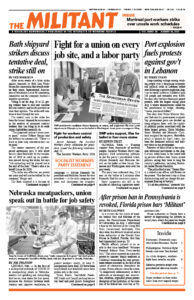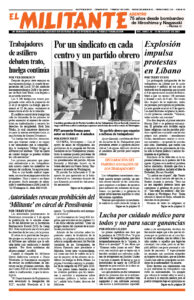Tens of thousands in Belarus took to the streets and built barricades in Minsk, the capital, and many more defied a sweeping security crackdown across the country, to protest the sham reelection Aug. 9 of President Alexander Lukashenko. They chanted “Freedom!” and “Long live Belarus!” This is the biggest political crisis in Belarus’ post-Soviet history.
Thousands of mostly young people were arrested nationwide. One was killed and dozens injured as riot police used tear gas, rubber bullets, truncheons, and, by the third night, live fire, to suppress the demonstrations. Two days after the polls, Svetlana Tikhanovskaya, the opposition candidate who had claimed victory, was forced to leave for Lithuania.
Officials claimed Lukashenko had won 80% of the vote. Election monitor group Golos estimated it was Tikhanovskaya who had won that proportion.
After the Stalinized Soviet Union disintegrated in 1991, the new rulers in Belarus established close ties with the new, dominant Russian government next door.
Lukashenko, a collective farm manager before Belarus gained independence, came to power in 1994. He has ruled the East European country of 9.5 million ever since, maintaining power by suppressing political rights. Lukashenko rode out earlier protests after fraudulent elections in 2010. Years of economic stagnation have now turned into a recession crisis for working people during the pandemic.
In the months before these elections, Lukashenko jailed his two main bourgeois rivals, including Sergei Tikhanovskaya, the candidate’s husband, and forced a third to flee the country. These patently political detentions sparked the first street protests.
Tikhanovskaya stepped in to run against Lukashenko after the May arrest of her husband, galvanizing opposition to the autocratic regime. Her political program focused on free, fair elections; freeing political prisoners; and ending the absolute powers that marked Lukashenko’s presidency.
People lined up for miles to sign a petition to get Tikhanovskaya on the ballot. Despite a growing police crackdown her largest rally drew over 60,000 in Minsk, with tens of thousands in smaller cities.
Two days after declaring victory, Lukashenko had Tikhanovskaya escorted out of the country together with her campaign manager, Maria Moroz. With her husband behind bars, nine members of her staff were detained as hostages. Only Moroz was freed.
On YouTube, Tikhanovskaya said she had been forced to make “a very hard decision” to join her children in Lithuania, where they had been sent to safety before the elections.
“If Lukashenko won 80%, why does he need riot police, rubber bullets and water [cannons]?” protester, Anna Vitushko told the Aug. 11 Christian Science Monitor. “They can cheat a few percent of the population, but they can’t cheat the entire country.”

